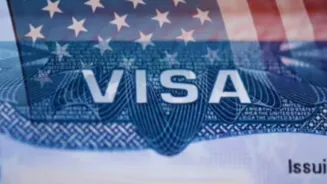Applicants for US non-immigrant visas (NIV) will now be required to schedule their interview appointments in their country of citizenship or legal residency, except in cases where the United States is not
conducting routine NIV operations.
Indians who need to travel to the US on short notice will no longer have the option of securing faster B1 (business) or B2 (tourist) visa appointments in another country, a practice many relied on during the Covid-19 pandemic, when wait times in India stretched up to three years due to a massive application backlog. If such a situation arises again, that flexibility will not be available.
Non-immigrant visas (NIVs) cover a wide range of categories, including tourism, business, students, temporary workers, and individuals engaged to marry US citizens. The new restriction is part of a series of changes introduced under the Trump administration to tighten visa rules.
The option of applying in a third country had originally been allowed during the pandemic to ease pressure on US consulates in India. With the latest revision, the US Department of State (DoS) has withdrawn that relief. According to Gnanamookan Senthurjoti, founder of immigration platform The Visa Code, many applicants who had filed for student (F-1) or visitor (B1/B2) visas, and in some cases, even work visa renewals, in destinations across Europe, Asia, and the Middle East will now be required to reapply under the new framework.
How Will It Affect Tourism, Business Travel
For both tourists and business travellers, the new policy significantly complicates trip planning. Earlier, many applicants managed to cut long wait times by scheduling visa appointments in nearby countries such as Dubai or Bangkok. That option is now closed, removing a key workaround for those needing to travel urgently for business meetings, family events, or vacations. Given the United States’ popularity as a leisure and work destination, the change could disrupt countless travel plans.
The revised rules highlight the need for much earlier preparation for US-bound trips. Applicants will now have to account for longer processing times in their home country when organizing their schedules. For tourists, this could mean adjusting itineraries or even selecting destinations with more lenient visa requirements. For business travellers, it raises the stakes of advance planning, as last-minute trips will be harder to arrange.












